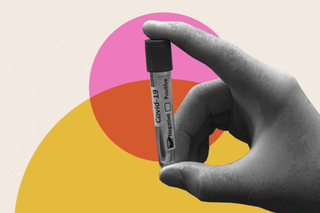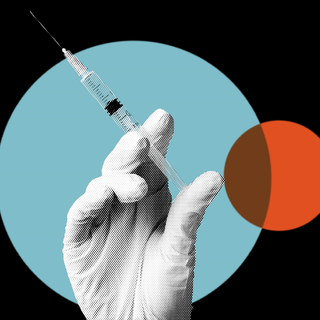
Scientists Find Why Some People Test Negative for Covid19 Despite Exposure
The proteins in immune cells that showed resistance to exposure could help develop vaccines for all coronaviruses.

Among the many anecdotes of Covid19 infection, one is of people who may be exposed to it but still manage to evade infection. According to new research, understanding an individual’s natural immune response may hold critical answers for future vaccine development.
“Everyone has anecdotal evidence of people being exposed but not succumbing to infection,” Leo Swadling, an immunologist at University College London and lead author of the paper, said. “What we didn’t know is whether these individuals really did manage to completely avoid the virus or whether they naturally cleared the virus before it was detectable by routine tests.”
Published in Nature journal on Wednesday, the study looked at 731 U.K. healthcare workers’ immunity during the first wave. This is also a time when people had not generated antibodies. Researchers found about 15% of people had not tested positive despite exposure to the original coronavirus. In other words, the participants’ natural immune response existed even before the start of the pandemic.
Covid19 immunity is an unfolding puzzle. One piece of that comes in the form of T-cells, a sort of “immune cell” whose main purpose is to identify and kill infected cells. In the current research, T-cells from previous infections (seasonal coronaviruses that cause the common cold) may have offered a degree of Covid immunity. In other words, the T-cells may have cleared the virus before any symptoms cropped up, what is called “abortive infection.” The health workers in the study had high levels of T-cells that reacted against Covid19.
“These pre-existing T-cells are poised ready to recognize SARS-CoV-2,” said Swadling, offering a sort of “immune memory.” Previous research has looked at the immune response of T-cells. In 2020, when researchers tested blood samples taken years before the pandemic started, they found some already had a pre-existing degree of resistance against the virus — before it ever infected people.
Related on The Swaddle:
Without Vaccines, Covid19 Reinfections Can Occur Every 16 Months: Lancet Study
The research does two things. It answers why some people don’t test positive for Covid19 despite exposure through family and friends, a question experts have posed before.
Two, the research could be a building block for a “new generation of vaccines” that target the T-cell response. Covid19 vaccines currently are based on antibody resistance: antibodies directly target the spike protein that allows SARS-CoV-2 to enter the cell. The antibodies neutralize the virus and offer protection against illness. Some vaccines may offer immunity up to six months, research has shown. “However, the immunity wanes over time and a potential weakness of spike-based vaccines is that this region of the virus is known to mutate,” The Guardian noted. So while the current vaccines are extremely effective and prevent serious illness, people are still catching Covid19 infections.
T-cells, on the other hand, with their abortive infection, target the “replication protein,” a machinery common to both common colds and Covid19. Studying the T-cell response could then, in theory, help with a vaccine that offers protection to all coronaviruses. The lingering T-cells may also offer a longer immunity (measured in terms of years) in comparison to antibodies.
Researchers noted the protection from T-cells alone may not be enough to be fully immune. But “the involvement of T-cells could still be beneficial – and the more we understand what’s going on, the better,” BBC noted earlier.
“What we’re hoping, by including these T-cells, is that they might be able to protect against infection as well as disease, and we hope they would be better at recognizing new variants that arise,” Prof. Mala Maini at UCL, who was part of the current study, told BBC.
Understanding the T-cell response could help with future vaccines that target both – the replication protein in addition to the spike protein (what current vaccines do). “A vaccine that primes T-cell immunity against different viral protein targets… would complement our spike vaccines that induce neutralizing antibodies,” Andrew Freedman, reader in infectious diseases at Cardiff University School of Medicine, said. It could then produce a more robust immunity in theory.
“Insights from this study could be critical in design of a different type of vaccine,” said Dr. Alexander Edwards, from the University of Reading.
“Hopefully this study will lead to further advances in vaccine development, as we need all the types of vaccine we can get.”
Saumya Kalia is an Associate Editor at The Swaddle. Her journalism and writing explore issues of social justice, digital sub-cultures, media ecosystem, literature, and memory as they cut across socio-cultural periods. You can reach her at @Saumya_Kalia.
Related


HPV Vaccine Can Cut Cervical Cancer Cases by 90%, Proves Vital Study
